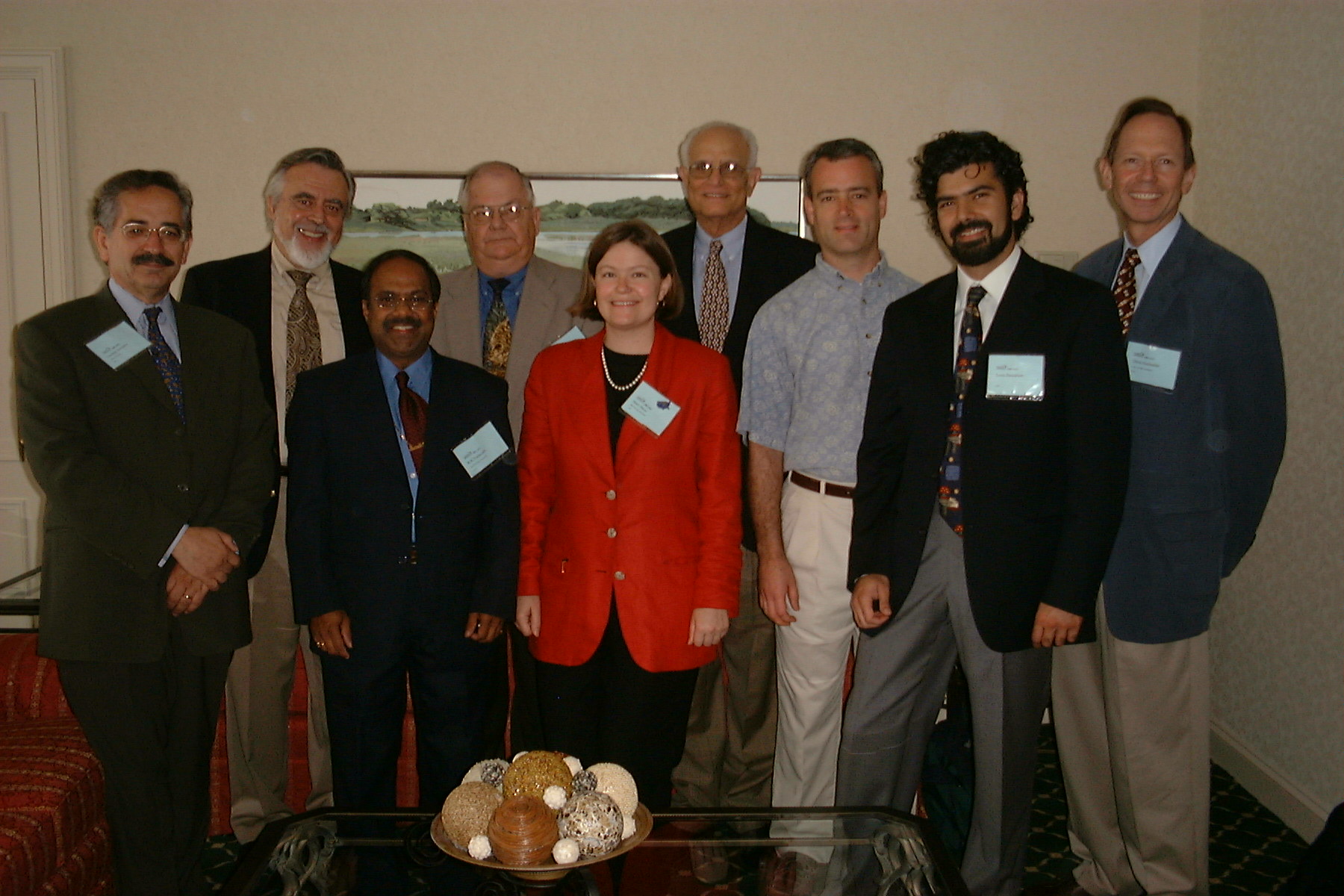

2001 Awards recipients with AACC Awards Chair D. Auslander, AACC President N. Kheir, and AACC Vice President
President C. Georgakis
From left: C. Georgakis, D. Bertsekas, R. Yedavalli,
W. Thompson, D. Tilbury, N. Kheir, A. Teel, L. Zaccarian, and D. Auslander

2001 Bellman Award recipient A. Balakrishnan with D. Auslander and N. Kheir
 The Richard E. Bellman Control Heritage Award
The Richard E. Bellman Control Heritage AwardThe award is given for distinguished career contributions to the theory or applications of automatic control. The Bellman Control Heritage Award is the highest recognition of professional achievement for U.S. control systems engineers and scientists. Richard E. Bellman, for whom the award is named, was an applied mathematician who pioneered the development of system theory as an academic discipline in the 1950s and 1960s. His accomplishments are described in IEEE Transactions on Automatic Control, 1984. The Bellman Award is unique among the AACC awards in that it is made for lifetime contributions to control and systems engineering. Such contributions may cover a range of technical areas or may have been put into practice in several different fields. The winner of the Bellman Award usually has been involved with the interaction of control or system theory with other scientific disciplines, with the engineering profession, and/or with the implications of controls for society at large.
Awarded to A.V. Balakrishnan for pioneering contributions to stochastic and distributed systems theory, optimization, control, and aerospace flight systems research.
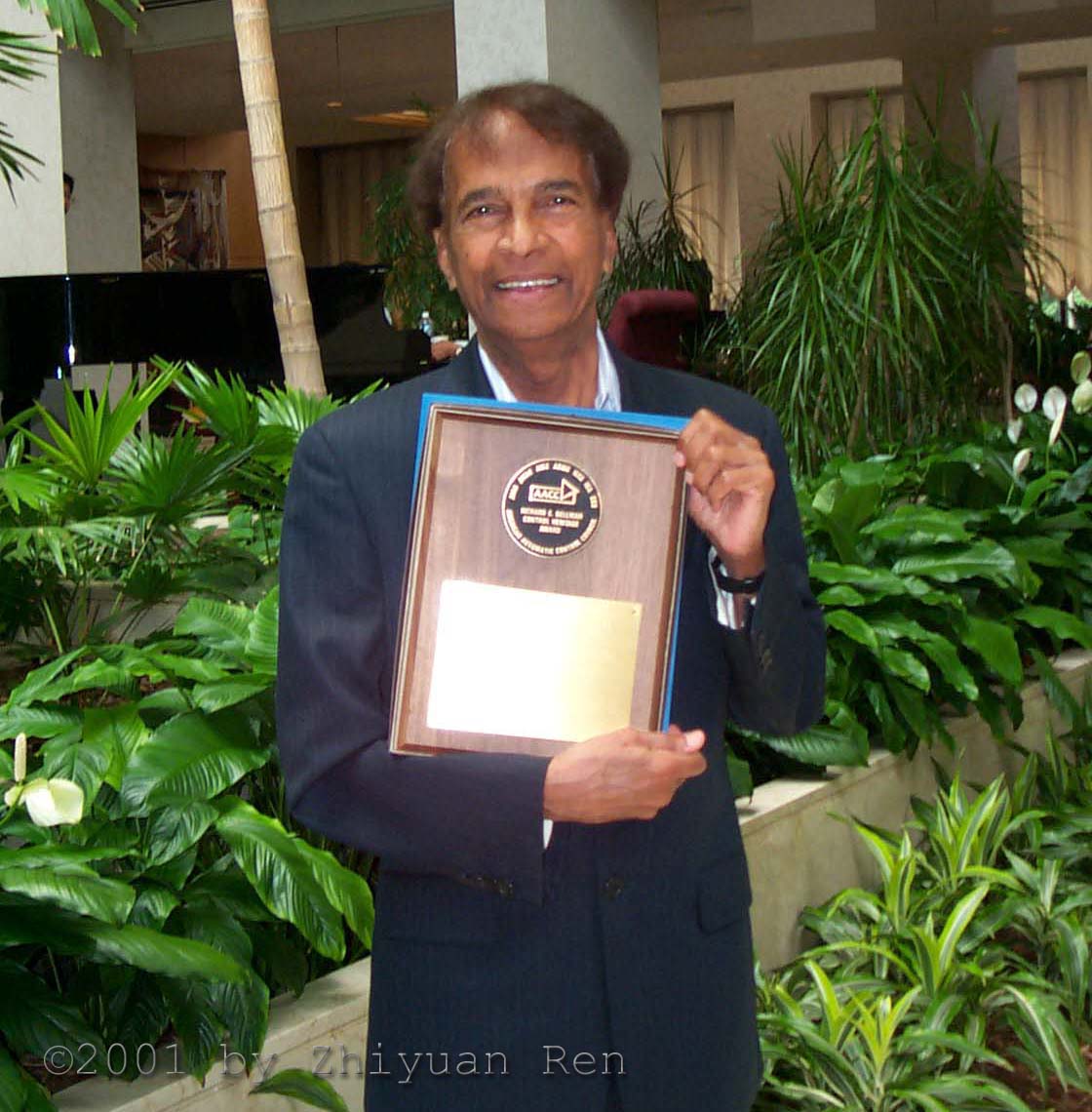
 The Donald P. Eckman Award
The Donald P. Eckman AwardThe Donald P. Eckman Award was the first award established by the American Automatic Control Council. It was established in memory of Donald P. Eckman, who made important contributions to control theory and practice in the 1950s and 1960s but died tragically in an automobile accident in 1962. The purpose of this award is to recognize, particularly, important contributions to the control field made by younger researchers. The age limit for the award was originally set at 30 years, but was later extended to 35 years of age (at the time of the award) as the control field grew and matured, in recognition of the difficulty of making leading edge contributions to a more mature field. While the Eckman Award is given for key contributions made prior to the age of 35, the recipient is normally expected to be the type of individual who will remain a leader in the controls profession; he is an example to be emulated by engineers entering the profession.
The Eckman award is often given for key contributions to a single field of research, based on the discovery of a new phenomenon or design method or scientific principle. In practice, the award has usually been given to individuals who make theoretical contributions which have practical implications. However, the development of devices (e.g., as reflected by patents), or significant contributions to engineering practice, might also be recognized.
Awarded to Dawn M. Tilbury for research exemplifying engineering aspects of control systems and for significant contributions to logic control and networked/distributed control.
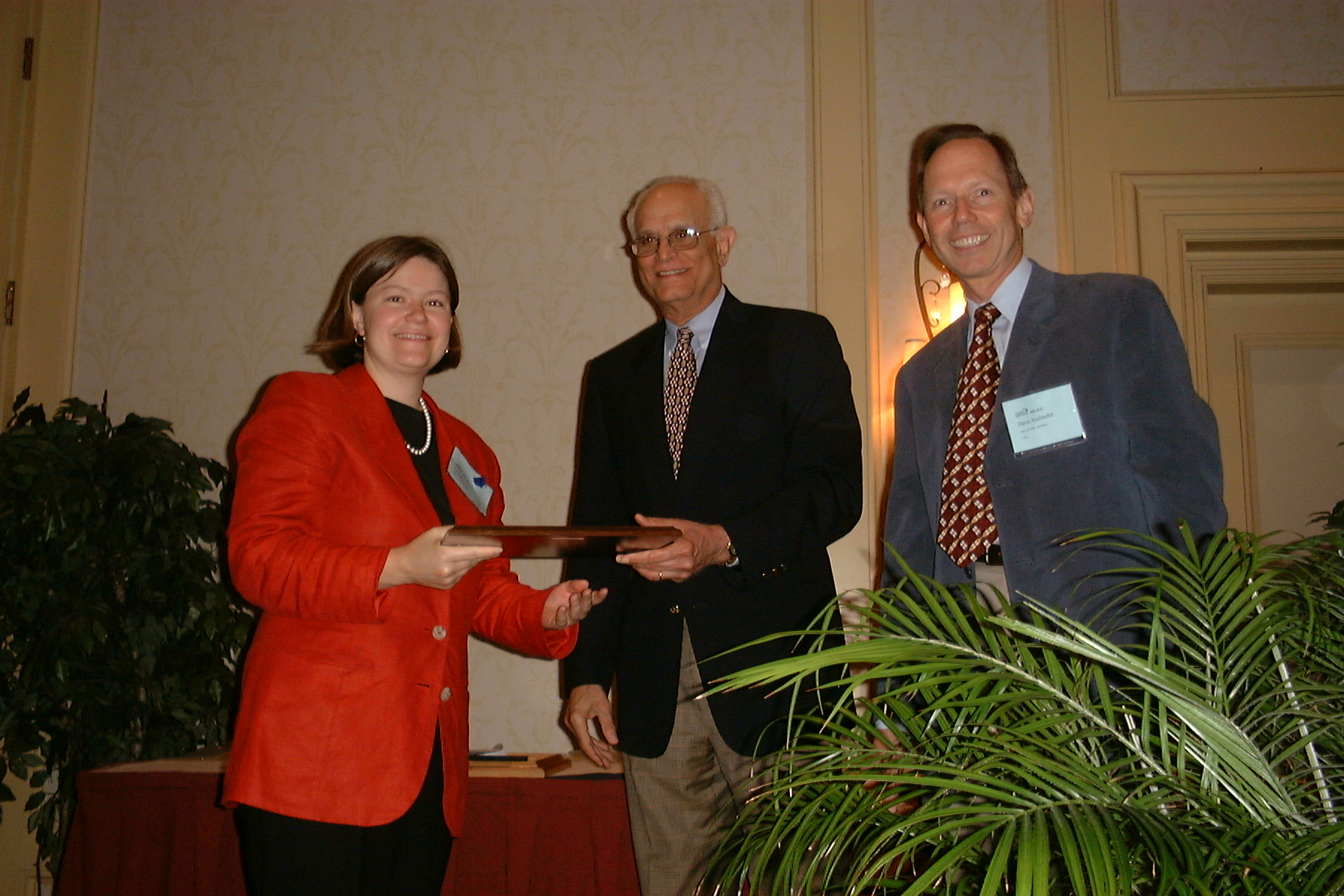
 The John R. Ragazzini Education Award
The John R. Ragazzini Education AwardThe AACC Ragazzini Award is given for outstanding contributions to Control Education in any form. These contributions can be from any source and in any media, i.e., electronic, publications, courses, etc. Due to the large number of well qualified nominees, this award is often one of the most difficult to assign.
In evaluating a nominee for the Ragazzini Award, it is common for the Award Committee to seek evidence beyond what is provided in the nomination, such as searching the Citation Index, or considering the leadership positions assumed by graduate students, or evaluating key research results of former graduate students. Education is viewed as a process which extends beyond the classroom or the advising functions of a particular faculty member. The Ragazzini Award has normally gone to university professors, but there is no formal requirement that nominees must be university professors. Accomplishments of former students may be considered in making the award.
Awarded to Dimitri P. Bertsekas for outstanding contributions to graduate education and research in systems, control and optimization.

 The Control Engineering Practice Award
The Control Engineering Practice AwardThe Control Engineering Practice Award is given to one individual or one team to be selected from those nominated for significant contribution to the advancement of control practice. The primary criterion for selection will be for the application and implementation of innovative control concepts, methodology, and technology, for the planning, design, manufacture, and operation of control systems. Achievement and usefulness will be evidenced by the benefit to society and by the degree of acceptance by those who use control as a tool. The work on which the nomination is based must have been performed while the nominated individual or at least one member of the team was a resident of the USA. The award consists of a certificate and an honorarium. In the event that the winner is a team, each member of the team will receive a certificate and the honorarium will be divided equally among the team members.
Awarded to Warren A. Thompson for vision in process control application, ability to create buy-in at all levels, and world-wide influence on technology acceptance.
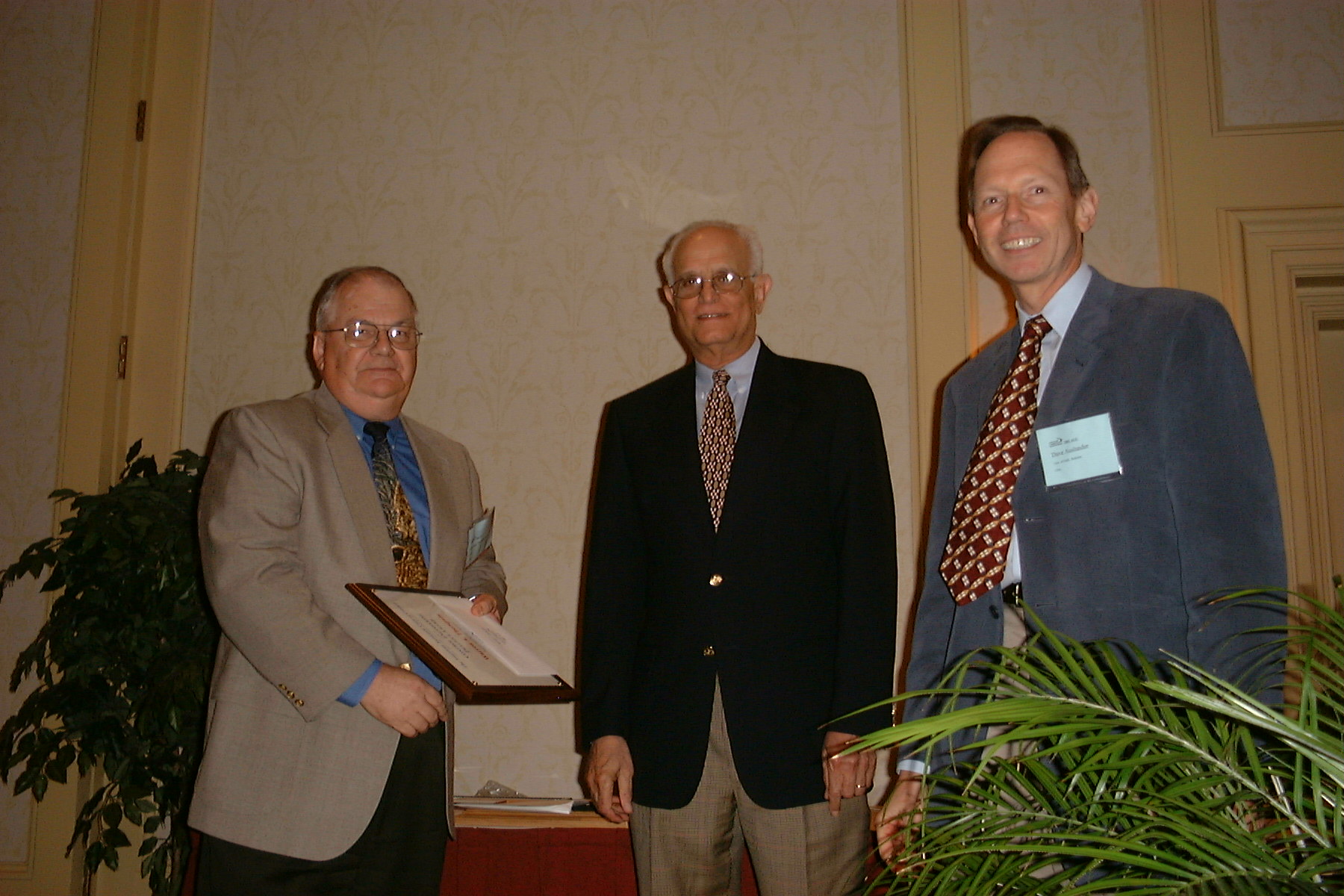
 The O. Hugo Schuck Best Paper Award
The O. Hugo Schuck Best Paper AwardThe Best Paper Award is given for the best paper presented at the previous year's American Control Conference. In 1987 it was named after O. Hugo Schuck, a pioneer in the practice of flight control design at Honeywell, Inc., and later at NASA. This award was established with the purpose not only of recognizing technical contributions, but also the manner and effectiveness with which they are communicated to the community at the American Control Conference. There are no restrictions on the number, age, or affiliation of authors.
The main source of nominations for the Best Paper Award is submissions by attendees at the conference, who are provided with nomination forms at the registration desk to be used for the following year's conference. Nominations from other sources, following the conference, are also acceptable. Selection criteria include quality of the written and oral presentation, technical contribution, timeliness, and practicality.
Awarded to :
L. Zaccarian, A. R. Teel, and J. J. Marcinkowski, for contributions to control applications in their 2000 ACC paper, Anti-windup for an Active Vibration Isolation Device: Theory and Experiments

L. Zaccarian and A. R. Teel receiving the award
and
R. Yedavalli, for contributions to control theory in his 2000 paper, A Necessary and Sufficient Extreme Point Solution for Checking Robust Stability of Polytopes of Matrices.
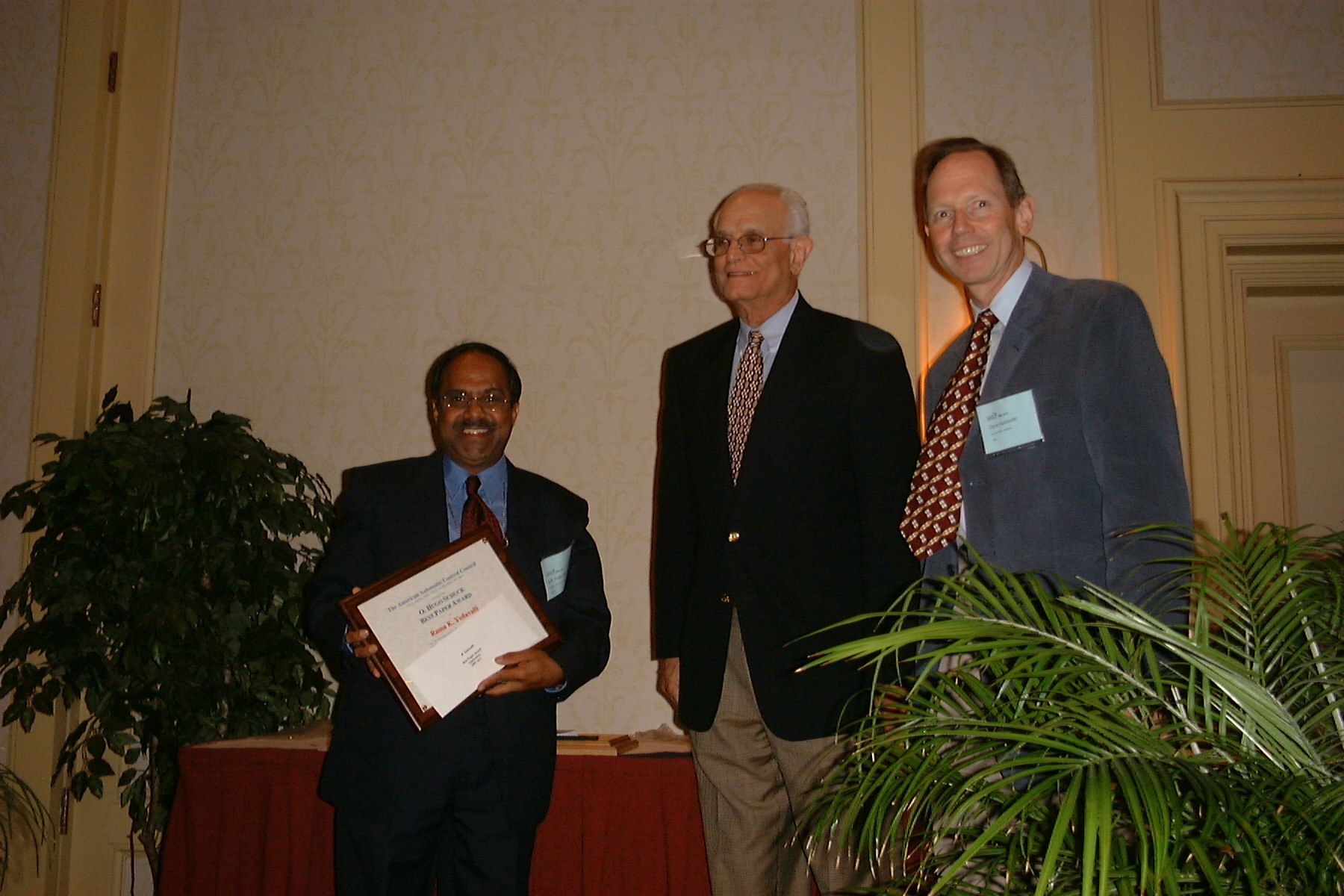
R. Yedavalli receiving the award